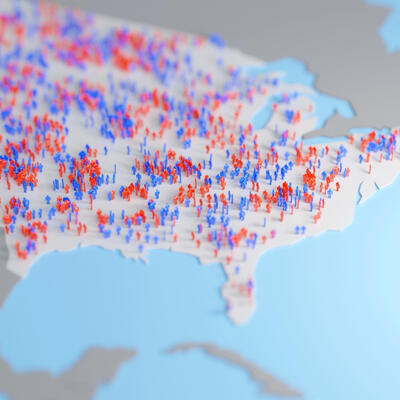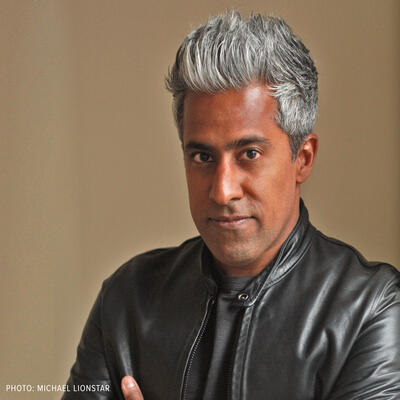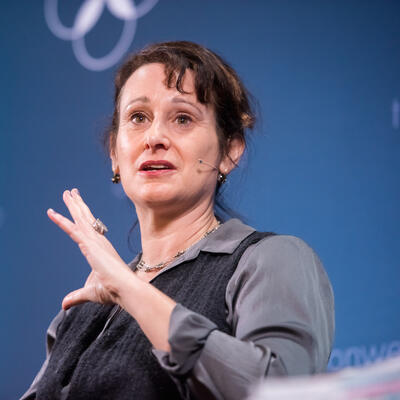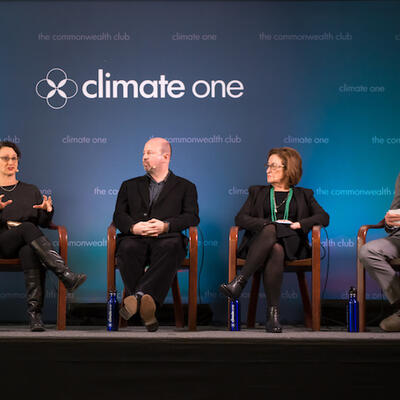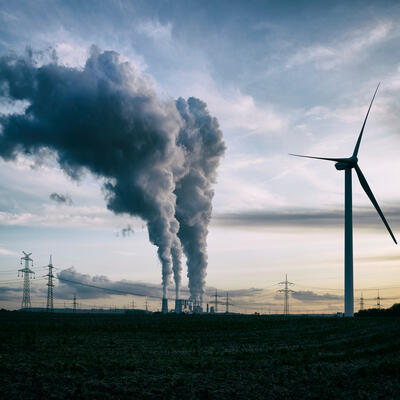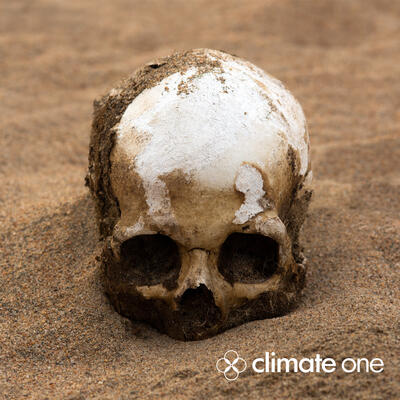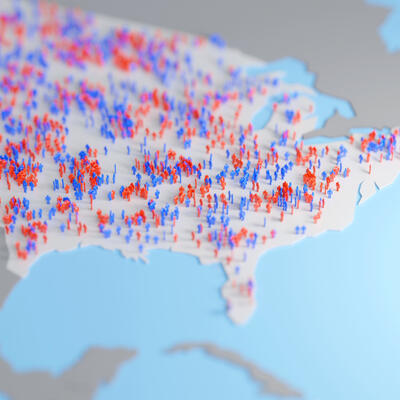
Bridging The Great American Divide
Guests
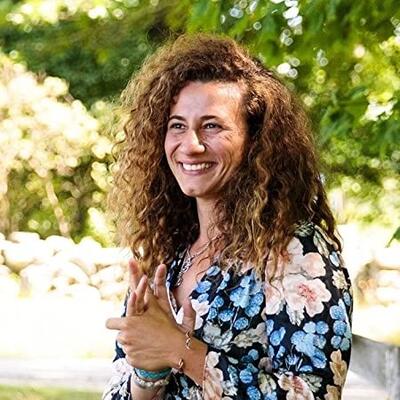
Chloe Maxmin
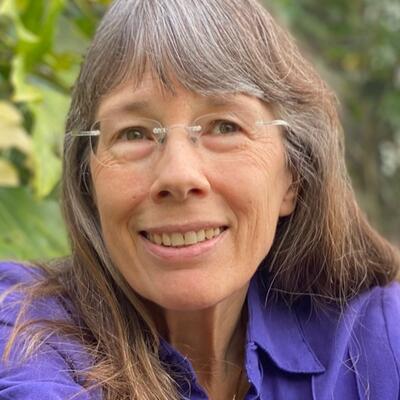
Joan Blades
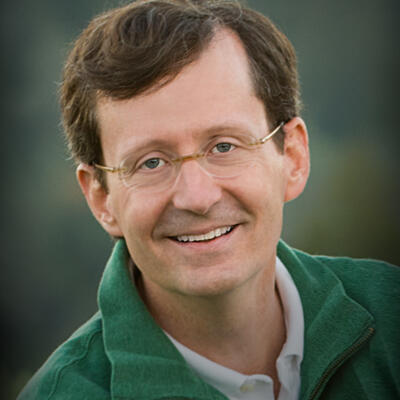
John Gable
Summary
Most Americans support climate action, but you wouldn’t know it from Congress or the courts – or from most of the media. A recent study found that a majority of people significantly underestimated the extent to which their fellow Americans are concerned about climate disruption, as well as public support for policies to address it. That misperception can affect our ability to work collectively on climate action.
People on both the left and the right experience the same devastating floods, the same life-threatening heatwaves and catastrophic wildfires. Yet in our increasingly online and partisan world, we tend to isolate ourselves from information that disagrees with our worldview.
“We all are biased. We all live in bubbles. We cannot rely just on ourselves to be fair or balanced, or see the world evenly,” says John Gable, co-founder and CEO of AllSides.com, a website dedicated to fighting political polarization online by presenting the same issue covered by media outlets with different political leanings.
“Common ground is boring for press, it's not good click bait,” he says. Falling back onto polarizing viewpoints and echo chambers is often easier, especially via social media. But finding that common ground across partisan and other divides is essential to making progress. “We have to decide what's more important to us: being right about that issue or actually solving the problem.”
And it seems that in the last decade it’s become more difficult to have a good conversation about climate across the political spectrum. Back in 2008, for example, John McCain and Barack Obama shared a similar stance on climate change.
Mediator and attorney Joan Blades is a co-founder of MoveOn and LivingRoomConversations, an open source platform to encourage discussion across ideological, cultural and party lines. She recommends starting from a place of relationship-building as a way to find understanding with people who hold different views. “It's that relationship and starting to soften these boundaries that we’ve been creating between each other that's most important,” she says.
As an example, with one friend, “when we started becoming friends, climate wasn't on his list of concerns. And it got on his list of concerns not because I'm a brilliant presenter on climate but because he cares about me,” Blades says.
Chloe Maxmin, a Democrat and the youngest woman to ever serve in the Maine State Senate, is also a big believer in relationship-building as a means toward progress. After a two-year term in the state house, she was elected to the state senate in 2020 – unseating a two-term Republican incumbent. She and her campaign manager co-wrote Dirt Road Revival, a book detailing their approach to politics and on-the-ground campaign strategy.
Maxmin says instead of the traditional canvassing approach asking for a vote, she and her staff approached voters as people. “I always think of it as ‘Making a Friend 101.’ You don't show up, especially on someone's doorstep, on their porch and their kitchen and say ‘hey, you want to argue about abortion with me.’ You show up and say ‘hey, I’d love to get to know you, find out where our common ground is and let's see if we can build a relationship from there.’”
And in these conversations, the language we use matters.
“One of the biggest epiphanies that I had while doing this work is that so much of the time we completely align on values, but there are buzzwords or policies or just other things that are really divisive and prevent the conversation from happening,” Maxmin says.
Maxmin says months of knocking on doors in rural Maine taught her it’s important to not be so rigid and ideological.
“Every single person in this country is impacted by the climate crisis…and people are gonna talk about it and think about it in different ways in different places,” she says. “We just got to have open hearts and open minds.”
Related Links:
All Sides
Living Room Conversations
Climate Change Actions Are Far More Popular Than People in U.S. Realize
Dirt Road Revival: How to Rebuild Rural Politics and Why Our Future Depends On It
Full Transcript
Ariana: This is Climate One. I’m Ariana Brocious, in for Greg Dalton. Most Americans support climate action, but you wouldn’t know it from Congress or the courts – or from most of the media. A recent study found that a majority of people significantly underestimated the extent to which their fellow Americans are concerned about climate disruption and public support for policies to address it.
People on both the left and the right experience the same devastating floods, the same life-threatening heatwaves and catastrophic wildfires. Yet we tend to socialize within insulated political tribes, operate in completely different information bubbles and see the problems and solutions through different lenses. How can we learn to bridge ideological divides, develop trust, and find the common ground needed to rebuild respectful civil discourse?
John Gable is co-founder and CEO of AllSides–a website dedicated to fighting political polarization online by presenting the same issue covered by media outlets with different political leanings.
Mediator and attorney Joan Blades is a co-founder of MoveOn.org and LivingRoomConversations.org, where she uses an open source platform to encourage discussion across ideological, cultural and party lines.
Climate One Host Greg Dalton asked John and Joan–a Republican and Democrat, respectively–to reflect on how it’s become more difficult to have a good conversation about climate across the political spectrum. After all, back in 2008, John McCain and Barack Obama shared a similar stance on climate change.
Joan Blades: Well, politically the story of climate became one of the polarization points, which is kind of a tragedy. When in fact what I've seen over the last 10 years is the opportunities have totally changed. The cost of clean energy is less than the cost of oil, you know, that we can do clean energy so much more effectively is good for the local community good for the global community. And at this point, I think our division is causing us to not see how much we agree. There are huge opportunities and we are just not grabbing them because we’re so caught in this fight.
Greg Dalton: And John, this is painful for you because you think that there’s more agreement on climate than a lot of other things.
John Gable: So much more agreement on climate than most issues. A large majority of Republicans do believe in climate change do believe it's impact that's man-made do believe it's impacting our lives. Huge majority agree with some of the specific solutions like planning a trillion trees or actually using tax credits and other types of financial measures to encourage better behavior. There is a lot of agreement there and I think that's actually what we need to focus. I mean the political class who get elected by saying we’re better than all those other guys do not emphasize common ground. Common ground is boring for press, it's not good click bait. And actually, if you’re trying to raise money as an environmental group saying hey, we agree with the other side isn't necessarily the best way to raise money telling your contributors to the other side is evil and they’re terrible and awful. That's the easier way to raise money. So, there's a lot of opportunities here to actually work together and focus on the planet. I think all of us who really believe in this issue or any issue, if you will. We have to decide what's more important to us being right about that issue or actually solving the problem. So, if you hear me or somebody, you’re talking with saying hey, let's plant a trillion trees. Let's do financial incentives to have cleaner air. And I also say I don't think the climate is as big of an issue as you do. I think there are other issues that are more important today. So, if you stop and listen to that and think about how you might how we might respond to that person. If your tendency is to respond by saying oh the climate is really bad you're not paying attention to these things and that thing about the UN, saying that some of these scenarios aren’t likely to happen la, la, la, la. That’s one approach. The other approach is do you want to plan a trillion trees do you want to do financial incentives? Let me help you do that, let me introduce you to groups that want to do that. I will help you do that. The first response of saying what they’re wrong about is really about me or us being right. And my gosh we love being right all of us do we’re human beings we like being right. But does that really save the planet? If it's more important to you to solve the problem to address climate change, I recommend the other approach. Finding the common ground seeing where you agree and working together to make it real.
Greg Dalton: And a variation of that that I've heard is you want to be right or you want to be in relationship. And many people like that's like oh the relationship, right. So, Joan how does that when you're talking with people who have different views than you, you know, is there a little voice in you that wants to like spring facts or counter them or do you think, oh this is my friend, I'm going to be quiet and listen and bite my lip.
Joan Blades: Well, I'm not biting my lip these days. I mean what's been really great about this is making friends like John who I am curious why are saying things. John’s brilliant. John is someone I really trust at a deep level. And when we disagree it causes me to look at what I'm thinking. What I believe and where are the holes and why do we see things differently. This stuff is confusing. I mean it’s not that it makes life simpler, it's really easy when you got black and white, but we don't. And there's actually a lot of colors in this whole system too.
Greg Dalton: And you say that there’s, you know, research shows that people make gut judgments about people and our brains follow. So, what is that mean and contrary to often people say it’s not rational we got to be rational we got to be optimal.
Joan Blades: Yeah, people keep on thinking we’re rational beings. And it's nice fiction but over 90% of the time if you look at the science over 90% of the time we’re doing it by gut and then our reason follows. We rationalize why we made the right decision and that's human. So, you know, with my dear friend in Utah when we started becoming friends climate wasn't on his list of concerns. And it got on his list of concerns not because I'm a brilliant presenter on climate but because he cares about me.
Greg Dalton: Wow, he cares about the climate because he cares about you and you care about climate.
Joan Blades: Yes, and another friend of his, he has two people that he feels close to and we really care. And I care about him being concerned about being put in a position of being isolated and othered, you know, we care about the people we love and what they care about and that's good. So, whereas talking about climate change is really important, talking and having relationships across differences is critical also.
Greg Dalton: And it just seems, John, that so many conversations with people care about something they try to persuade over and one conversation over one beer or one meal. And so, how do you approach, is persuasion a persuasive or other way to connect with people?
John Gable: Joan has completely convinced me and brought me on board with the relationships-first piece. And when she and I first met, friends of us introduced us and we were at a walking around on a walk in Reston, Virginia on some parking lot. And I always say that if Joan Blades asks you to go on a walk, go on that walk because it was transformative for me at least. And what we found that we are both --
Greg Dalton: But did you trust her? She's this founder of this liberal MoveOn.org thing. Did you trust her?
John Gable: I never lived in a place where most people agree with me, so it doesn't bother me. Yeah, I’m a Republican in San Francisco who worked for Mitch McConnell so I’m really popular here. So, that's not unusual for me. And I'm actually I love discovering people I love finding that kind of brightness in them it’s just something I've learned, being from Kentucky and also being in both poor areas and then very wealthy affluent areas and going back and forth to like Bar Harbor, Maine, and coal mining Kentucky I learned at an early age how people can other, others, whether it's people without wealth othering those people fortunate or vice versa. And you begin to get a good sense of real character and not being caught up in the kind of covering of the book or the stereotypes. And so, it was very obvious to me what anybody who meets Joan it's not hard at all to recognize the sincerity and intelligence and just solid person she is. And we discovered that we are working on the same thing. I came from the technology side. 25 years ago, I worked at Netscape team lead for Netscape Navigator or the product managers. And 25 years ago, I gave a speech saying how I thought the Internet might actually train us to discriminate against each other in new ways. How I thought it might actually, as it evolved, divide us. And that was concerning because those of us who work in technology, those of us stayed up obscene hours, we wanted to create this thing and made it possible for us to all have better information to make better decisions.
Greg Dalton: It was gonna democratize information.
John Gable: And you can make better decisions on everything in life. And we would know people as individuals around the world because we connect with them on things like Zoom today and really get to know them. That was the dream of those of us working crazy. And in a lot of ways the Internet has done that. But when there's a lot of money or a lot of politics or a lot of power involved it's doing the exact opposite. And so, when we started AllSides, AllSides.com 10 years ago started creating technologies what I was describing was the Internet's broken. It's not doing what it was intended to do, and that's both scary but also kind of good news because that's technology we can change that. The business models around it we can change those. But whether they speak to our better angels inside of ourselves or whether they pull out the worst of us. That's what we have to develop and focus upon.
Greg Dalton: And I think it's fascinating that all sides actually uses humans in that. It’s a site that sort of compares side-by-side the headlines and narratives on the left the center and the right and they’re labeled LL, C, RR. And I thought oh, there must be some algorithm that’s doing that. But you got humans which I find fabulously reassuring.
John Gable: And I am a technologist, but I do think people get carried away with AI or algorithms. Because all algorithms mean, is it somebody you don't know behind a closed door deciding what was important and then they wrote the computer just decide that. So, they are biased. They are biased by whoever wrote them. And we were very interested in coming up with the system that was not in danger by our own biases. In all sides we have people in the left and right and everything in between. We joked we have never had food fights and occasionally some of our arguments get a little bit heated. But we consciously have people across the board but that's not good enough. And journalists who really work hard to present news fairly they’re just doing it inside themselves. We all are biased. We all live in bubbles. We cannot rely just on ourselves to be fair or balanced, or see the world evenly. So, we created a system based on American people all across the nation to be able take a look at different things and we reflect what they would see. And we use that not so much to say, oh, you’re news media you’re a left or you’re a right. We use it mainly as a way to enable all of us to quickly see different perspectives on the same issue on the same news. Because the idea of technology for my point of view is to enable human beings to do what we do best think for ourselves decide for ourselves connect with other people. Technology is to serve that not replace that.
Ariana: This is Climate One. I’m Ariana Brocious, and today we’re talking about bridging divides across political and cultural boundaries. If you missed a previous episode, or want to hear more of Climate One’s empowering conversations, subscribe to our podcast wherever you get your pods.
Let’s get back to the conversation between Greg Dalton and Joan Blades of Living Room Conversations and John Gable of All Sides.
Greg Dalton: So, Joan, when you're talking to your conservative friends in Berkeley where you live people talk about planet and earth and others talk about markets and jobs. So, how do you deal are you careful about the language you use?
Joan Blades: Absolutely. When I started Living Room Conversations it was to be about climate and energy. We rapidly learned we should just have an energy conversation because people that don't believe in climate aren’t coming to a climate energy conversation.
Greg Dalton: But energy you can get them in.
Joan Blades: Yeah, and the people that care about climate they’ll be here about that in the process. Over time I've come to believe that, have a conversation about anything. It's that relationship and starting to soften these boundaries that we’ve been creating between each other that's most important. I mean talking about the technology there is a thing about algorithms that’s really problematic because with Facebook and all these different platforms. If it causes anger, fear, anxiety it's more likely to get shared and the algorithm is to get maximum profit which is maximum sharing. So, we have to become intentional about what we are taking in that's why I love All Sides because that’s a way of saying, actually, I want to see the full picture.
Greg Dalton: John, do you think that some of your liberal friends are too shrill and over worried about climate?
John Gable: I think everybody is in one issue or the other there's always people who are too shrill or too worried on any issue. It’s interesting, I don't really think about it that way. I do think that a lot of people in the right do think folks go too far --
Greg Dalton: Alarmist. Oh, it’s not as bad the climate, oh.
John Gable: And they lose little credibility when they kind of push some things. But I think that there is always a debate on any issue on different sides, on what's the solution there are always people who’d be a little bit more extreme. I think that's always going to happen particularly in an open society like ours we have different extremes arguing different pieces. I think the real question is what works, what do we do. And Joan mentioned that 3 1/2% of people 75% of Americans would prefer news that’s not slanted one way or the other or 78%, my apologies from Pew Research. And that's a big change from just two years before that where it was in the 60s. We have 3.5% of the people of America being engaged in some kind of idea for movement to succeed. If we only talk about voters that’s like five and a half million people or a little over 10 million people we’re just talking about adults. That's a very achievable number. We’re talking specifically about how to engage that number of people in ways that really solve problems. Because when you get the number of people engaged culture changes policy changes. And the fact that there are some people who may be more shrill or one way on the extremes on either side of the issue. I try not to be disrespectful about it, but to some extent they don't really matter. The people who matter are the ones who are trying to solve the problem who are truly listening to each other to solve the problem to avoid the pitfalls of either extreme. And there's even a lot of evidence that doesn't suggest but shows repeatedly that if you get a room full of just experts and you get another room of experts and novices who don't know anything about the topic and you give them the same problem. The room with a mixture of experts and novices will get the right answer right 90% more often than the pure experts. So, we need to be challenged. And so, if you really believe in the data you got to commit to the processes that work to lead to better solutions which includes open conversation with people who disagree with us who aren’t experts in the area in order to get the better solution decided and acted upon. And that's our opportunity and it's a very real thing. This is not just little kind of oh this is nice those are real numbers that we can achieve. And we’re building technology, not just in terms of sharing news, but how to have thousands and tens of thousands of hundreds of thousands of people to meet online in a video format using a Living Room Conversations type guide so that they do what I like to describe as accidentally discovering the humanity of the other person.
Joan Blades: So, one of the thing that's exciting, you know, COVID cost us not to be here for a couple years, but we’ve got tens of millions of people that are really comfortable having conversations by Zoom now. We have a problem with local connection. We also have a problem with national trust in connection. It would be possible if people are ready to show up. We could do this at a massive level if people wanted to. Now, what makes this harder than what I did with folks years ago with Move On is you just sign a petition you wrote a sentence about why you wanted to censure and move on. This requires showing up with
Greg Dalton: Relationships are hard they take a lot of time and like they’re kind of messy and like you get vulnerable.
Joan Blades: And we have a problem with loneliness in this country, isolation and belonging. So, it’s the answer as well as the hard thing.
John Gable: It’s both a hard thing and what everybody in the nation in the world who are feeling alone are craving. We are wired to be tribal. We are wired to go against each other. We’re also wired and needing connection. And connection across differences means that I can show you who I really am, rather than what I'm supposed to be according to TikTok videos or whatever that has to be which really damages us psychologically. So yes, it takes more work but it is really as Joan points out, fun and much more fulfilling at a deeper level. We as a society need this even outside of climate change. We as a society need to learn how to connect and disagree in order to share who we really are and be more fulfilled as human beings and healthier.
Joan Blades: Last year a book was written called The Power Strangers just about all this data about how we’re better off when we talk to strangers. We have fears about that and we have to overcome them, but we’re happier we’re healthier it brings our day up. And so, this is actually creating a context where we shift the story so that more people that talk to strangers. But the beauty of the one form of Living Room Conversations was it his two friends each invite two friends and that personal invitation you get to meet a couple strangers you get to see a couple friends. And then you have a conversation that goes deeper than it otherwise would.
Greg Dalton: But, you know, John, in the political system however, I hear that we’re wired for this, we need this and the business and political incentives are all going toward the extremes for the clicks and the primary wins. So, what does that mean we have to change culture first?
John Gable: Well, you're seeing we’re seeing in a lot of hard data a real rebellion against that. So, Churchill's old quote was “America will always do the right thing, after it’s tried everything else.” And I think we tried everything else recently. And now we’re going, that's not working. And there is a shift: there's over 5000 organizations nationwide according to something that Princeton did that are focused on bridging divides. The demand for something other than the pundits yelling at each other is real. Even news organizations such as CNN and many others are now saying, you know what, maybe we were too extreme maybe we need to change it so we actually hear the other side more. And they don't do that unless customers are going hey, there's a problem here. All the data showing a big push back against that. We do want something better. We did try something and it worked out well. And a lot of us on all sides on left and right, no pun intended, by left and right we’re seeing that the problems aren't being solved. And when you're not heard long enough and your problems that matter the most aren't being addressed, we tend to get angry we tend to elect more extreme people to solve the problem. When that doesn't work we try something else. We’re gonna keep on trying until we solve it. And so, I think we're learning as a nation that the real extremes are not helping that much. There's a climate caucus in the House. Newt Gingrich is pushing Republicans in elected office to work on more solutions to climate issues. But when he and Van Jones, when they were doing Crossfire together every time they agreed the producers will to him and say, stop doing that it’s bad for our ratings. And that’s still true. But people began to get tired of the what I call pro wrestling fights, you know, they’re just always making as much noise as possible get news. And the fact that news in America has the lowest level of trust in any nation top 45 nations in the world according to Pew, there is less trust in America for our news system than any other nation. And the more and more they go for that clickbait and just taking one agenda or the other or just emphasizing the differences and never dealing with problems, the more and more their credibility go down. That's the biggest problem in news media today is their lack of credibility or what I say the lack of trustworthiness.
Joan Blades: And I’d say it’s something even more than unhappy with the news. It's like it's causing people to turn it off because it makes them unhappy. It makes them anxious. It makes them fearful.
Greg Dalton: My wife can't stand watching, she's disgusted and I think I have another problem I take in too much of it. So, I've been trying to have a news diet lately because I realize it’s kind of toxic for me, like do I really need that one more article about whatever it is like is that… to have an information budget diet just like that’s enough.
Joan Blades: I read a whole book about how it’s bad for you to like really limit your news intake. So, yeah, what does that say?
Greg Dalton: Listen to more podcasts, that’s what I think.
Joan Blades: I think would -- yes, this is a positive solution.
Greg Dalton: And also, yeah, to have a little bit of variety because I think we get on this wheel of like inhaling information and somehow, I feel like the more I know, I don’t know, something, the better I am.
Joan Blades: So, the question is, as we try and know more so we can persuade our friends is have you actually persuaded someone that really disagrees with you? And that's really interesting things about the Living Room Conversations. When we have a conversation that's about a polarized topic you don't want to get a bunch of people that agree in the room because you come away feeling more extreme about that. You really want to be very intentional about differences in that room. And there also depending on the conversation you're having it can be age differences it can be cultural differences it can be political differences gender differences. It all depends.
Greg Dalton: And so, one thing you mentioned just brought up for me, you know, villainization. It’s so easy to villainize and raise money. So, let’s talk about villainization which is part of this polarization. Because there are some people in climate world who are villainizing oil companies and like say, oh, you talk to an oil company or you whatever, like you’re a suspect. John, what do you see?
John Gable: Well, that’s a tried-and-true American entertaining thing to do. I mean back early days we’ve always done that but there was a difference. Back then, when we had and I mean articles written by Ben Franklin or the Tories or Common Sense. They were really, really out there and villainizing --
Greg Dalton: Vicious.
John Gable: Vicious. I mean we’re kind of kind tamed to a lot of things that were written back there but there was a difference then. The difference is that the people reading those articles first of all, they knew that that was from Ben Franklin, The Tories. So, they already knew the point of view of that news. They did not believe that news is somehow accurate. They realized they were different opinions.
Greg Dalton: They were party papers.
John Gable: Yeah. And the time in America, the Walter Cronkite period, “this is the way it is” was really an aberration in history. Most of American history and most of history and all nations I'm aware of have always had kind of partisan different news organizations trying to persuade you. So, one thing is that they had a higher level of media literacy the people who are reading these pamphlets they understood that what they were reading wasn't necessarily true. So, a little bit of news and media literacy is important. The other thing that was different is that if Joan and I were back then in the 1770s. Sure, she was reading that rag from The Tories but she helps me get my plow on stock for my yard the other day and we knew each other as people. And that is a huge difference to know people out there. And so, knowing people outside of our world. When we only know our world, we’d come really confidently ignorant because we know 10% of the story, we hear it 8000 times so we are absolutely true. We’re more confident, less knowledgeable and we relationship with others that's just a bad combination all around.
Joan Blades: We have self-sorted in an amazingly effective way. And so, it's sorting in our, I mean I live in Berkeley I can speak about this with great confidence. Where we live, where we get our information, in so many ways and in those places where the mix is there’s a lot of discomfort in there a lot of flags people put up so that they can talk about the weather rather than about things that are really meaningful. And that's one reason this is such a good practice rather, it's not a one-time thing. It's a practice in faith communities and libraries communities are saying okay we need this because they have found that there are these gaps and people are isolated in all sorts of ways that are not good for us.
John Gable: And support in schools too. School kids learn this more quickly, more easily. But it's actually a skill to learn how to listen to somebody you disagree with to really listen to understand. Not listen to answer not to listen to say how they’re wrong but to listen to understand that human being. And it's important, particularly in communities that may be more divided or have great crisis. It's great if you do it beforehand but when you hit that crisis, we need those skills. These are human skills, human beings learn this well. But we need the opportunity we need the tools online in our modern world where most the tools are doing the opposite. We need to provide people who want these tools to be able to hear each other and connect better and we’re building those to make that massively available to people.
Greg Dalton: Right. All the incentives and tools for transmitting not for receiving--
John Gable: We want to be right we want everybody to know that I'm right as opposed to tools for hearing and understanding others and connecting with others.
Greg Dalton: I’d like to bring this to a personal level. We've gone through a lot in the last couple years in American West, wildfires, they’re fast-moving we have droughts that are some ways fast some way slow. John, as someone who’s from Kentucky how have you personally experienced climate impacts in your own life in the last couple years and how is that --
John Gable: It’s interesting because obviously we were talking before on this show how in San Francisco there is this time when there are lots of fires and the smoke from the fires got caught underneath the fog layer of San Francisco. And the world turned sepia tone. This weird off orange color --
Greg Dalton: It was a Mad Max day.
John Gable: Yeah, you referred to Mad Max. For a real science fiction geek like me the second Outlander movie had this kind of thing, but it was and I thought that movie wasn’t realistic because it could never really look like that it looked worse than that in walking outside it was a bizarre world. How much is happening or what's happening or how quickly it’s happening what we can do about it…I don't know what the impact will be. There is a problem we do know there's a problem. How big the problem is what the right solutions are to the problem is really what I'm focused in.
Greg Dalton: Joan, how have you experienced climate disruption in your life personally?
Joan Blades: I mean those fires were just stunning. And I was born locally as I mentioned, so I'm not good with heat. I'm kind of, I wilt, you know, when we had 100° and it was 6 PM I was going this is not where I live. And there's a place in the Sierras that I have a really close connection to. There was a wind event over a year ago that took out all the amazing Jeffrey pines. There were three sentinel Jeffries. All the pines the ones that were healthiest were blown down because they had full sails. And now I see them when I go there and they’re on the ground. These are trees that are 700, 800 years old. It’s very, I’m so grateful for the beautiful days we’re having here right now and watching the fog. It hurts to see you know the trees that are suffering the droughts, you know, I’m grateful when we have a rainy day because I'm hopeful that more of those trees are gonna survive that are, you know, I'm watching everything struggling. I've probably get to the hills five days out of seven because that's the way I stay grounded and able to continue to work at what sometimes seems impossible. But we can do this.
Greg Dalton: On Climate One today we’ve been discussing bridging the great American divide with Joan Blades, Cofounder of Living Room Conversations. And John Gable, Cofounder of AllSides.com. Thanks for joining us and thanks to John and Joan for joining us. Thank you all.
Greg Dalton: Thank you.
Ariana: This is Climate One. I’m Ariana Brocious. Today we’re focused on finding better ways for communication and mutual understanding, especially across ideological divides.
Chloe Maxmin, a Democrat, is the youngest woman to ever serve in the Maine State Senate. After a two-year term in the state house, she was elected to the state senate in 2020 – unseating a two-term Republican incumbent. She and her campaign manager co-wrote Dirt Road Revival, a book detailing their approach to politics and on-the-ground campaign strategy.
Chloe told Greg Dalton her concern for the environment began at an early age, motivated in part by a development project.
Chloe Maxmin: It was a huge development proposal for the North Woods in Maine and especially around Moosehead Lake. Maine's Northern Woods are the largest tract of undeveloped woodland east of the Mississippi. And this very large real estate development company from out of state called Plum Creek wanted to come in and create, you know, marinas and golf courses and helipads and all these new houses and really alter the landscape of this part of Maine that makes our state what it is. And there is a lot of activism on the ground to organize against it. And I didn’t grow up in that region, but I spent a large chunk of my childhood up there. So, I got involved with that project. I remembered just really recognizing the deep need for economic vitality in rural spaces, but that the way that we get there is so deeply important because we can't exploit everything that makes rural places special.
Greg Dalton: Right. And that time climate still seemed far away in time and space for a lot of people. You went to Harvard, which has around $53 billion endowment. The joke is that Harvard is a hedge fund with the school attached on the side. While you were there you cofounded Divest Harvard. So, tell us about that, why you did it, what you hope to accomplish.
Chloe Maxmin: Divest Harvard was about trying to make sure that Harvard's massive endowment is not investing in fossil fuel companies. I think we’re all quite familiar with the profound devastation and injustices that fossil fuel companies wreak on communities all around the world, you know, especially communities where there is extraction, distribution, processing. Maine had a very small potential impact I mean compared to the actual impacts that so many communities face. It was just a threat. But ExxonMobil was trying to push through a large tar sands pipeline in Maine and across New England. And we all start organizing around that. And then I went back to school that fall and it was right when the fossil fuel divestment movement was starting to really kick off in 2011, 2012. So, many young folks starting to take action on campuses around climate and we started Divest Harvard and we started with a group of 10 folks on a weekday night in a random room on campus. And within a couple years we had over 70,000 people who had signed onto our campaign. And Divest Harvard began in September 2012 and last summer in 2021 Harvard finally divested.
Greg Dalton: You say that the divestment theory of change was compelling to you. How does that fit in with your own personal broader theory of change because divestment is about, you know, withdrawing, rejecting, separating versus kind of engaging which is a lot of what your book is about is rather than shunning it’s about listening and engaging.
Chloe Maxmin: For me the power of divestment really lied in how it mobilized a whole generation of youth activists. I mean so many of the folks that I work with so many of the young folks that we see in positions of leadership these days they’ve come out of the divestment movement. And I think it was a tool for us to engage with the climate crisis in a way that was tangible, effective and approachable. It's not a tactic that feels very far off or is you know in another state something that you can do rooted in your community and that we all have a stake in. And yes divestment in and of itself is a process of rejection, but tens of thousands of students have engaged with their University have engaged with activism and protests and blockades and sit-ins and now they're engaging with the political system because of how effective divestment has been as a tactic.
Greg Dalton: Right. So, I can definitely see how it spawned an era of activists and people. Though to be clear, you're saying that people should engage with the political right, but not engage with fossil fuel suppliers.
Chloe Maxmin: Well, I think that part of how I approach this work is that there needs to be multiple theories of change and multiple avenues of change. And there are lots of folks who use shareholder engagement as a tactic. It’s not something that I believe in because I think if that, you know, it’s really hard to change the foundation of a company's business model I just never saw that happening. But when it comes to our political system, we’re trying to hold our political system accountable to its true and core purpose. So, there is a pretty fundamental difference there.
Greg Dalton: So, constructive engagement can work in some places and others. In the United States, only 14% of the population lives in rural areas, but they have an outsized influence on who gets elected to federal office because of the structure of the U.S. Senate and the electoral college. Can you tell us more about your district, its makeup and history and politics?
Chloe Maxmin: Yes. I grew up in a small town in Maine of 1600 people and I live in Lincoln County, which is tied as the most rural county in Maine and Maine is the most rural state in the country. Lincoln County is also the oldest county by age in the state. And Maine is the oldest in the country. So, some interesting dynamics happening here. By the time I ran for office I was in a state house district that had voted for Trump in 2016 and a state senator strike that one for Trump narrowly in 2016. And after seeing Trump elected and really digging into the results and come into grips with the immense influence that rural America had on electing someone like Donald Trump, I decided to move back home and really dig into what was happening in communities like mine to be able to understand it better.
Greg Dalton: And you write that Democrats often look down on rural people. Why is that and what have been the implications of that?
Chloe Maxmin: I think I've definitely always heard these narratives of, oh, these rural folks there voting against their own self-interest and what are they doing. And kind of these narratives that portray rural folks as not really understanding the issues and undermining their own best future. And those narratives have been very, very loud to me when I've been in urban spaces and even sometimes progressive spaces. I think it's a narrative that makes it really hard for us to engage with rural folks. And in my experience, knocking doors in my district I’ve knocked 20,000 over 20,000 doors in my community that narrative has had an actual impact on the ground where folks think Democrats don't want to hear from me. They don't want take the time to talk to me. They just look down on me they think they're better than I am. And so, why would I vote for a Democrat.
Greg Dalton: Right. And having spent time in places like Montana and New Hampshire. I felt how people in those areas can feel the judgment of coastal elites and those they can feel the judgment they sense it, they feel it. In your book Dirt Road Revival, you write “Things move at the speed of relationships in rural America, you don't jump straight into business and take care of things as quickly as possible." How were you able to use that idea in your campaigning?
Chloe Maxmin: To us it really felt quite simple, you know, when we were having these conversations with folks many of whom had never been contacted by a Democratic campaign or canvasser in their entire voting history. We, both myself, my campaign manager, all of our volunteers we didn't show up and say, hey, this is Chloe this is who she is are you gonna vote for her yes or no? Do you know where your polling place is, yes or no? We didn't bring a traditional campaign script into the situation. What we did was we showed up and we said hey, you know, we’re from Chloe's campaigner, you know, I'm Chloe, just stopping by to see what's on your mind and how we can best represent what's going on in your life. So, it was really about building relationships with folks. I always think of it as just like making a friend 101 you don't show up, especially on someone's doorstep on their porch and their kitchen and say hey, you want to argue about abortion with me. You show up and you say hey, I’d love to get to know you find out where our common ground is and let's see if we can build a relationship from there.
Greg Dalton: Many are aware of the consequences of losing federal elections, as you point out in your book. The Democrats lost nearly a thousand state legislative seats over Obama's time in the Oval Office. What effect did that have on climate policy and why did the party not pay more attention to that?
Chloe Maxmin: I think it's had, you know, a monumental impact on climate policy or lack thereof. I mean we can kind of trace the loss of rural America from 2009 to 2019 when rural America went from an even partisan split to going 16 points, Republican. And we saw that manifesting in the election of Donald Trump who undid all good climate policies and certainly didn't pass any others. We also saw that coming to shape in state legislatures. And, you know, it's something that we've seen here in Maine as well where Republicans are just kind of gaining ground in rural places and flipping state legislatures. And then once they flip, they are able to control redistricting and gerrymandering ensues and the unraveling of climate policy. So, it's had a pretty devastating impact and I think the reasons why the Democrats have kind of let it slide by over the past decade are numerous. But I think one of the key ones is that Democrats have a very kind of top-down focus really focused on gubernatorial races congressional races and the presidential. And we’re in most of the time when you're looking at a statewide campaign, you're really thinking I just need to get as many Democrats out to vote as possible. And so, you get the best bang for your buck when you're doing get out to vote in densely populated spaces. You can knock 200, 300 doors a day per canvasser, whereas if you're where I am, you’re lucky if you can get to a 100 and there's places much, much more rural than where I am. So, it's just been a misalignment of resources, I think. And I really mean this to describe the National Democratic Party and the way that it operates. But as all this has going on there have been so many folks on the ground who have been pounding the pavement and really trying to hold onto some Democratic footholds in rural places and we got to honor all of that hard work too.
Greg Dalton: And some pundits have chalked up the loss of rural voters by the Democrats to simply nominating Barack Obama. A fairly blatant accusation of racism. You said that while racism plays a factor. It's not the whole story. Can you explain what you mean by that?
Chloe Maxmin: Yeah, I mean certainly talking to folks in my community I didn't really sense that that was part of the turn. I think that, I mean, I think that Obama’s presidency was very complicated, even for folks like me, you know who was, I volunteered on his campaign. I took time off when I was in college to go and canvas for him, I was so excited to get him elected. And I also felt kind of disappointed by his time in office, but you know, regardless of that, I think there's been a myriad of situations that have contributed to the loss in rural America. When you don’t have dollars going into campaigns and local candidates you don't have a local infrastructure, you know, we don't have enough County Democratic committees to really make sure that folks are activated and engaged. We don't have the kind of media presence that we need. Fox News and all the constituencies that it activates have become so powerful I mean, even in my own limited experience just you know, knocking on doors and hearing Fox News on in the background or hearing talking points from folks come directly from Fox News I mean the left hasn't built any type of communications channels that's even as remotely as effective as that. And so, there's just been on multiple fronts on which we've kind of let the ball down. And I actually think that Obama's race in 2008 was hugely successful in connecting with rural voters. And, you know, when I was canvassing the two big trends where that either people had never been contacted by a Democrat or they hadn’t been contacted since 2008 when Obama was running. I think that infrastructure was brilliant but it wasn't upheld, it wasn't fed and so it died.
Greg Dalton: And people just come around when they want your vote around election time it’s pretty predictable and transparent. How do you handle conversations with conservatives when they express opinions that are antithetical to your own beliefs or even offensive?
Chloe Maxmin: I think that’s such a good question and it's something that took me a long time to find my own answer to. I think I found a lot of space in myself to have conversations with people where we can agree to disagree and we can have very civil kind, insightful conversations, even if we’re coming out on opposite sides. And I think that's a really lost art that's so important for maintaining some sense of empathy in our political environment when that’s becoming very, very difficult. And of course, sometimes people say things that that I don't agree with or that I find offensive. And I found my own way to kind of talk back to that, ask questions about it understand where it's coming from so it's not something that completely ends the conversation. I’ve heard so many people say that they just kind of expect liberals and Democrats to yell at them and to school them on what's right and wrong when it comes to certain issues. There have definitely been so many times when people say things that are just too offensive for me to engage with. And at that point I say thank you so much for your time. I don't think we’re gonna, we don't have much to talk about here I’m gonna move on with my day. Thanks for talking. And that kind of approach I don't think my approach is not to argue with anyone not to try to persuade anyone but just trying to listen and understand what I'm hearing.
Greg Dalton: And people use different language. I'm curious how you chose your words and if you used words to reflect back to people that, I’m using your word or at least, which shows, kind of I understand you where I’m not using that other word that those other people use.
Chloe Maxmin: I mean one of the biggest epiphanies that I had while doing this work is that so much of the time we completely align on values, but there are buzzwords or policies or just other things that are really divisive and prevent the conversation from happening. So, really being able to focus on that deeper level of values was almost always there was space for a conversation there, even if there wasn’t agreement. And I think that was so important, you know, it’s about translating this work into a rural conservative context and it makes sense. We don't use the same language wherever we go. People don't communicate the same way in every state or in every community. And so, it also doesn't make sense that we would have like a one-size-fits-all approach to campaigning or talking about the Green New Deal or Medicare for all or you know lowering student debt. Those conversations require a different dialect in rural communities like mine.
Greg Dalton: Mentioning the Green New Deal, you wrote and helped pass and act to establish a Green New Deal for Maine. It was the first Green New Deal legislation to pass with the support of an AFL-CIO affiliate, which is a big deal because the national AFL-CIO has opposed federal green new deal framework. So, what is that bill do and how are you able to get support from a union?
Chloe Maxmin: Just for hyper clarity our bill in Maine was not like the national Green New Deal. We took a very targeted approach that was really meant to address climate change from a rural working-class perspective. When I was knocking on doors, I really heard people talk about wanting good jobs wanting a future in Maine wanting to go ice fishing every winter. And I rarely hear people talk about climate change. So, I wanted the climate legislation that I worked on to really reflect the reality and the conversation happening in my community. So, we called it Green New Deal for Maine to really try and bring attention to that different way of thinking about these issues. And I was really honored to work with the unions on the bill. It was really about making sure that large-scale renewable energy projects are hiring a certain number of union apprentices on most projects because it means developers can come to Maine and know that there's a workforce and then folks in Maine can get trained to know that they can get a job in the renewable energy sector. There is also another part of the bill that is focused on making sure that the renewable energy transition doesn't unfairly impact property taxes, which is a huge, huge issue in my community and so many rural communities where your property taxes basically fund our municipal services in our schools it’s such a huge burden and it's pricing people out of their hometowns and their houses. So, we just wanted to make sure that there is some protection there when we’re talking about you know okay a school needs to go solar because the state is requiring it. How do we do that in a way that doesn't impact a regressive tax.
Greg Dalton: The Green New Deal talks about a just transition to renewable energy. In your state of Maine there was a plan to put up wind turbines. It was fought hard by lobster fishermen who felt the plan would hurt their livelihood. There are some questions about wind turbine effects on sea life and fisheries. How does that fight shape your thinking about what a just transition looks like?
Chloe Maxmin: It’s a huge part of how I think about it. The two big wind projects in Maine actually are in my district. And so, it’s something that I heard a lot about you know and I think a just transition means that the folks who make a living on the working water that they are part of the conversation. Central to the conversation about how those waters are going to be used and they just weren’t, you know, they were left out of the process in so many ways and really felt taken for granted and used by these large out-of-state corporations that were coming into Maine with these proposals. We did, in the our legislative session last year, come to some good agreement where it passed unanimously. We didn't even have a vote on it where the lobstermen in the state and the federal entities did come to an agreement on how to move forward in a good way. But, you know, I think we have an opportunity to take a different path not to replicate the injustices of the fossil fuel economy. And if our renewable energy transition is going to mean that folks who have been lobstering for generations folks who make their living off of fishing if they can't do that anymore if they can't continue their heritage and be able to use all the equipment that they've invested all of their money, that’s not very just.
Greg Dalton: When you look to the future of your own career. You're not running for reelection. What are you focusing this empathy and listening skills on now?
Chloe Maxmin: I decided not to run again because I really want to support lots of folks running for office. I think that I can make a lot more impact by getting lots of folks elected instead of just getting myself elected. And I'm more excited about movement building. I'm more excited about electing tons and tons of young progressives in rural communities all across the country into office. I think that's a pretty exciting vision that could have a wildly huge impact instead of me just knocking my head against the walls in one district.
Greg Dalton: Well, this is a very powerful story. I'm really moved by your listening skills and empathy. And elsewhere in this episode we hear from Joan Blades, cofounder of MoveOn.org and John Gable who used to work with as an aid to Mitch McConnell about climate how our polarization is really problematic because when you get down to it as you've learned so many people agree on things related to energy and climate. Maybe they don't use that word but I just want to end there on terms of how climate is gonna fit into your work because Americans agree on climate a lot more than we realize that we admit to ourselves.
Chloe Maxmin: Yeah, I think it's so true, and I think the thing is it’s not being ideological about how we approach this work or how we talk about it. It doesn't always look a certain way or feel a certain way, but every single person in this country is impacted by the climate crisis. Everyone in Maine right now every farmer is dragging because there is no rain. And that’s the way that we talk about it and think about it here and people are gonna talk about it and thinking about it in different ways in different places. I think it sound so cheesy, but I feel like I’ve learned this lesson from listening to so many folks who are different from me and also being in so many democratic spaces that are pretty rigid about how we think about these issues. We just got have open hearts and open minds.
Greg Dalton: Chloe Maxmin is a Maine state senator and the author of the book Dirt Road Revival. Thank you so much, Chloe, for coming on Climate One. I really appreciate and inspired by your listening and your writing.
Chloe Maxmin: Thank you. Thank you so much.
Ariana: On this Climate One... We’ve been talking about the value of listening and connecting with those who hold different ideological or cultural beliefs. This is so important to fostering a healthier civil society–so maybe try having a conversation with a stranger this week.
Ariana: Climate One’s empowering conversations connect all aspects of the climate emergency. Talking about climate can be hard-- but it’s critical to address the transitions we need to make in all parts of society. Please help us get people talking more about climate by giving us a rating or review if you are listening on Apple. You can do it right now on your device. You can also help by sending a link to this episode to a friend. By sharing you can help people have their own deeper climate conversations.
Greg Dalton is Climate One’s founder and host. Brad Marshland is our senior producer; Our managing director is Jenny Park. Our producers and audio editors are Austin Colón and me, Ariana Brocious. Megan Biscieglia is our production manager. Our team also includes consulting producer Sara-Katherine Coxon. Our theme music was composed by George Young (and arranged by Matt Willcox). Gloria Duffy is CEO of The Commonwealth Club of California, the nonprofit and nonpartisan forum where our program originates. Thanks for listening.
